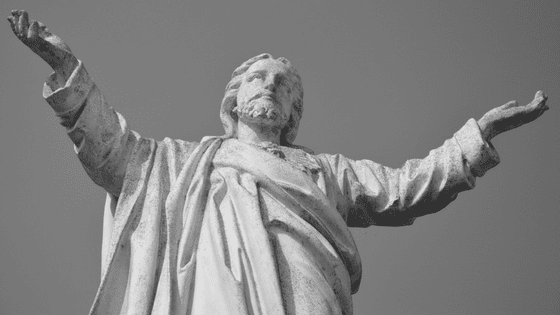Jesus. Who in God’s name was he?

Firstly, let’s tackle his actual name.
Since Jesus is a Greek name, he wouldn’t have been called “Jesus” by either his his family or followers. They would have referred to him as “Yeshua,” an abbreviation of the Jewish name for “Joshua” which means “to rescue” or “to deliver.”
The Christian Scriptures (New Testament) were written in Greek. Consequently, the authors translated his name to Greek as “Yesous.” The English version of this name is “Jesus.”
At the end of the day, most Christians call him by that name today.
I’ve always felt that to not call a person by their actual name is a bit insulting, but maybe that’s just me.
Ironically, Jesus was not a Christian; he was an Orthodox Jew. The followers of Jesus first referred to themselves as followers of “The Way.”
According to Acts 11:26, the disciples were first called Christians in Antioch circa 44 CE (Common Era), over a decade after Jeshuah’s execution by the Roman Army. But that is another story.
In what year was Jesus born?
Many Christians assume he was born on DEC-25 in the year 1 BCE (Before the Common Era; equivalent to BC). That way, his birth would have occurred with days of the time when all history is divided between:
• BCE (Before the Common Era) a.k.a. BC (Before Christ) and
• CE (Common Era) a.k.a. AD, or Anno Domini, (The Year of the Lord).
The year remains unknown but there are some clues in the Bible that point to a date approximately 5 BCE:
• Luke 1:5 says that he was born when Herod was King of Judea — that is, sometime between 37 BCE to 4 BCE.
• Luke 2:1-4 says that he was born when Cyrenius was Governor of Syria — that is, sometimes after 4 or 5 BCE (scholars differ). The passage also says that everyone had to return to the city of their ancestors to be registered and taxed.
There is no historical record of this actually happening outside of the Bible. It should have been mentioned extensively because it would have involved a massive movement of people which would have paralyzed all other activities in the Empire at the time.
There was a census in Judea during 6 CE, but this was only a local census that was conducted to facilitate later taxation.
During the 6th Century CE, Dionysius Exiguus (a.k.a. “Denny the Dwarf”) fixed the year of Yeshua’s birth as 0001-DEC-25 BCE.
In what month was Jesus born?
We can be fairly certain that he was not born on DEC-25. Luke 2:8 mentions that shepherds were living in their fields keeping watch over their flocks by night.
In reality, long before that time of the year, the flocks would have been moved from the fields into pens.
Fortunately, the approximate month of Jeshua’s birth can be approximately determined from the month of John the Baptist’s conception:
• Luke 1:5 says we know that Zacharias — John’s father — was a priest “of the Abijah division of the Temple service corps.”
• 1 Chronicles 24:15 says that priests of that division began temple service at the start of the 9th week of the year. But by the end of that week, the Jewish Feast of Weeks festival had begun. Thus, he would have remained on duty until the end of the 10th week.
• Luke 1:23-24 mentions that at the end of his service, Zacharias returned directly to his home, and that John was conceived shortly thereafter — probably during the second half of the month of Sivan.
• If we assume a pregnancy lasting nine months. John would have been born sometime in the springtime.
• Luke 1:36 states that the angel visited Mary when John’s mother Elizabeth was 6 months pregnant.
• Luke 1:31 says that Mary conceived very shortly after the angel’s visit.
• If we assume another 9 month pregnancy, Jesus would have been born about 6 months after John — sometime in the fall of the year.
Why did the Christian Church choose December 25th?
Many ancient pagan religions chose the Winter Solstice as the birth date of their Gods and Goddesses. This is the day with the shortest daytime and longest nighttime in the year. It happens on or about DEC-21.
However, people in those days lacked precise methods of measuring time intervals. They waited until after the actual Solstice when the daytime was noticeably longer, and settled on DEC-25 as the approximate date of the Solstice. This was a very important time, because it indicated that the daytime was lengthening. That was evidence that Spring and the start of the growing season would once again return.
Some of the Pagan deities in what is now Europe and the Middle East who were also believed to have been born on DEC-25 were: Apollo, Attis, Baal, Bacchus, Dionysus, Helios, Hercules, Horus, Jupiter, Mithra, Nimrod, Osiris, Perseus, Sol Invictus, and Tammuz.
Yeshua, ironically, shared many of the events in his life with some of the Pagan goddesses and gods, including the virgin birth, a murder attempt, organizing of a group of twelve disciples, a death, visiting the Underworld, resurrection, etc.
To learn more about the similarities between Pagan and Christian practices, click here.
For example, the Roman God Attis was born of the virgin Nana on DEC-25. He was killed by being crucified on a tree in order to bring salvation to humanity. He was resurrected on a Sunday. His followers began worshiping Attis cica 200 BCE. During religious services, they symbolically ate bread which represented his body.
Oddly, nobody seems to have recorded the actual birth date of Yeshua.
Saturnalia was a major annual celebration honoring the Roman god, Saturn. It was moved to DEC-25 by Emperor Domitian who ruled from 51 to 96 CE.
Also, DEC-25 was considered the birth date of Mithra, a Persian god, who had a large following in ancient Rome. They celebrated DEC-25 as the festival of “dies natalis solis invicti,” the “birthday of the unconquered sun.”
The early church often selected dates and locations for its own use that were considered sacred by existing Pagan religions. They found that it was easier to do this rather than create new dates and locations, because it simplified their followers’ conversion process from Pagan to Christian.
So, DEC-25 became recognized as the birth day of Yeshua/Jesus starting at some date before 354 CE. 1
I’ve always favored the Autumn equinox as a good date to celebrate Jeshua’s birth because it seems to have happened around that time of the year. It’s a date that’s also linked to the change of the seasons. But, again, maybe that’s just me.
References
Salusbury M. (2009) Did the Romans Invent Christmas. Retrieved from http://www.historytoday.com/
To read more insightful faith based articles, please visit us at Religious Tolerance.











